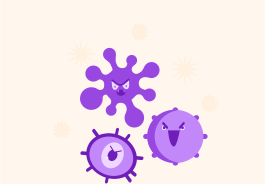disease
Some diseases are caused by pathogens, which include viruses, bacteria, fungi and protozoa.
The human body has defence systems to prevent pathogens from causing harm. They include physical and chemical defences, and the immune system.
Several methods can be used to prevent and treat disease, including aseptic environments and the development of different antibiotics.
To keep up with the high demand for new drugs to treat diseases, the production of pharmaceuticals is a fast-paced field of medicine.
Antibodies are developed by scientists for a variety of uses in medicine, from pregnancy tests to cancer treatment.

What Are Monoclonal Antibodies?

Producing Antibodies

Commercial Uses of Antibodies: Pregnancy Testing

Other Commercial Uses of Antibodies

Evaluating the Use of Antibodies
Vaccines give the immune system a chance to learn how to deal with pathogens, without the person becoming ill. They prevent the individual from contracting the illness in the future.
Plants can become diseased from pathogens like viruses and fungi, be infested by pests like aphids, or become deficient in essential minerals.
Plant defence systems include a range of physical and chemical barriers, in addition to mechanical adaptations which physically defend the plant.


